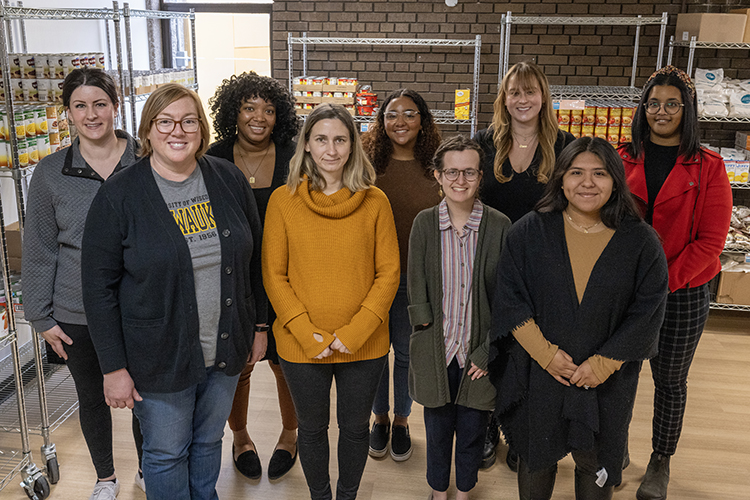Sometimes students need a little extra support on their way to graduation.
Maybe it’s help managing personal or academic stress. Maybe it’s help paying for an emergency car repair. Maybe it’s figuring out a way to stretch the food budget a little further. Maybe it’s a laptop that dies right before an important paper is due. Or maybe it’s a combination of all these pressures.
UWM’s Support U initiative is designed to help students meet these needs for extra help as they arise.
The Support U team, which operates out of the Dean of Students office, provides students with a place where they can get together with people who can link them up with campus resources and/or help them brainstorm solutions to their problems.
“The case management team works with about 400 to 500 students a semester,” said Rebecca Freer, associate dean of student services. “When we get student reports, requests and referrals, we will do some type of coordinated outreach with the student or the person reporting a concern.”
Helping students thrive
“UWM students are incredibly resilient and dedicated,” said Adam Jussel, dean of students. “With the right resources in place, they can thrive in the classroom and also in life. To be a campus that focuses on students, we need to support them in each facet of their lives. Support U does some of that — providing students a place they can come to when they face challenges that they can overcome, sometimes with a nudge or help.”
The majority of requests for help come in from students themselves, Freer added. However, in some cases faculty, staff and advisors may refer to Support U students who are experiencing challenges.
Support U also expands and fosters a broader culture of support through workshops, training and outreach to faculty and staff, Jussel said. “This isn’t one office or area’s responsibility. The Support U team can lend their expertise to staff and faculty so they have the tools to support students when they are in need. This is about building out that network of support and capacity.”
The team can help students find resources for mental and physical health issues, connect them with the UWM food pantry or the emergency grant program. In some situations, with multiple, overlapping issues, a case manager may work directly with the students.
Empowering students
A key goal is to build and maintain student trust, said Sarah Albertson, a graduate student in clinical and mental health counseling who is one of the case managers. “We want to empower them, give them agency. We ask about their concern and look at what options may be valuable for them.”
The largest number of contacts involve mental health issues, either from college stresses or from family issues, according to the Support U Team members. The Student Health and Wellness Center and counseling services help the team support students’ mental health needs.
Financial concerns are another key issue, with housing concerns a major factor. Each semester, the basic needs coordinator receives between 200 and 300 UWM Emergency Grant requests and lends 200 laptops to students.
“Hands down the biggest thing our emergency grants go for is rent,” Freer said. Also high on the list are unexpected medical bills and ongoing expenses such as utilities.
An emergency grant may help in these housing situations, said Tima Guled, a support coordinator who is a member of the team, but the team also has worked with students who are couch surfing or facing homelessness. In one case, for example, the team worked with campus partners to find options for the student.
Food pantry helps stretch budgets
The campus Food Center & Pantry is a vital resource for students who are trying to stretch their budgets, according to Allie Dorshorst, a basic needs coordinator who manages the food pantry. The pantry serves approximately 300 students and distributes 4,000 pounds of food during a typical week.
“The UWM Food Center and Pantry serves around 300 students per week,” Dorshorst said. “The pantry allows students to receive free food items as well as personal hygiene items. This allows students to focus on their classes instead of worrying about where their next meal might be coming from, as well as helping supplement their funds.”
Sometimes students face family or personal health emergencies, or even a death in the family, Freer said. Recently, for example, a student was injured and her mother killed in a horrific traffic accident. When the situation is so serious that the student needs to withdraw from classes for a while, the Support U team can help them through that process. Each semester, the appeals coordinator assists between 300 and 400 students in completing medical withdrawals or navigating appeals and campus processes.
Campus partners such as the Student Health and Wellness Center, the Student Success Center, University Housing, UWM Police Department, University Housing and the Student Parent Success Program provide access to a variety of resources, according to the Support U team members.
Brainstorming and connecting
Often students are not aware of these resources. “Each student has a unique set of circumstances,” said Jill Finnel, one of the case managers. “We brainstorm and connect them to other offices they may not be aware of.”
The team also works closely with colleagues at the Waukesha and Washington County campuses, which have their own emergency grant programs. Waukesha also has a food pantry. In some cases, when it’s necessary the team can reach out to resources outside of campus.
The program is having an impact in helping students stay at the university and complete their degrees, according to the statistics the team has collected. For example, of the 219 students who received emergency grants in Fall 2022, 94% graduated and/or re-enrolled in the next term, compared to 89% for all UWM students.
In addition to Freer and Jussel, members of the Support U team are:
Tima Guled, case manager; Allie Dorshorst, basic needs coordinator; Dominique Smith, appeals coordinator; and graduate students in the social work program and clinical counseling programs including Sarah Albertson, Jill Finnel, Abigail Hudson-Ramirez, Charlee Vrtjak and Arianna Smith. Other staff in the Student Services office are also ready and willing to help, Jussel said.
People who’d like to support these initiatives are encouraged to give to the Chancellor’s Student Success Fund.






